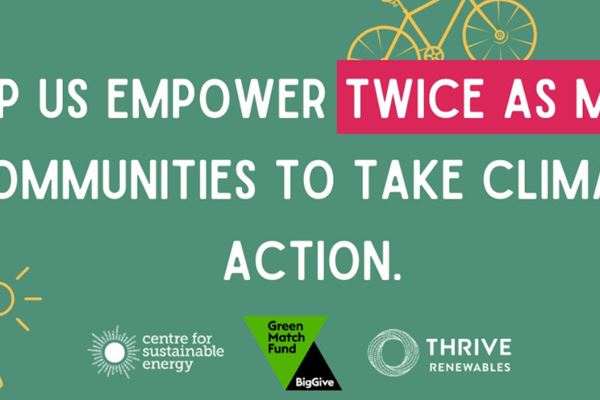We’re pleased to announce another good financial and environmental performance in 2020 as we publish our Annual Report today. Profits in 2020 were £1.4 million with a turnover of £13.5 million. Our wind and hydro projects continued to deliver impact, collectively generating nearly 150,000 MWh of renewable electricity, enough to power 40% of the UK’s EV journeys7. This clean energy generation has avoided the emission of 66,689 tonnes of carbon dioxide3.
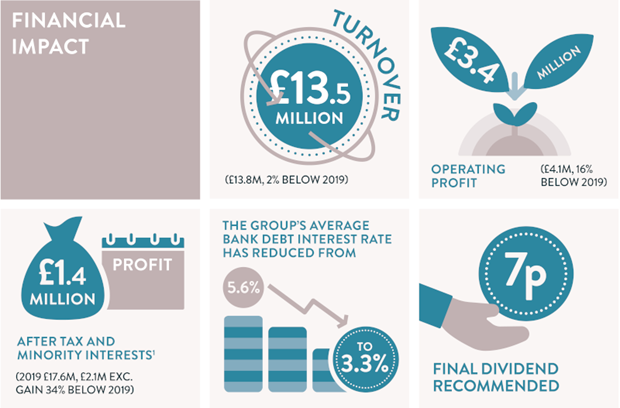
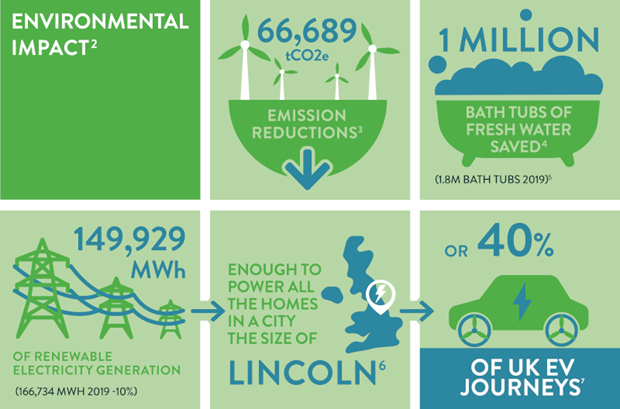
In 2020 we deployed profits from the sale of two wind farms in 2019 into a range of new clean energy projects.
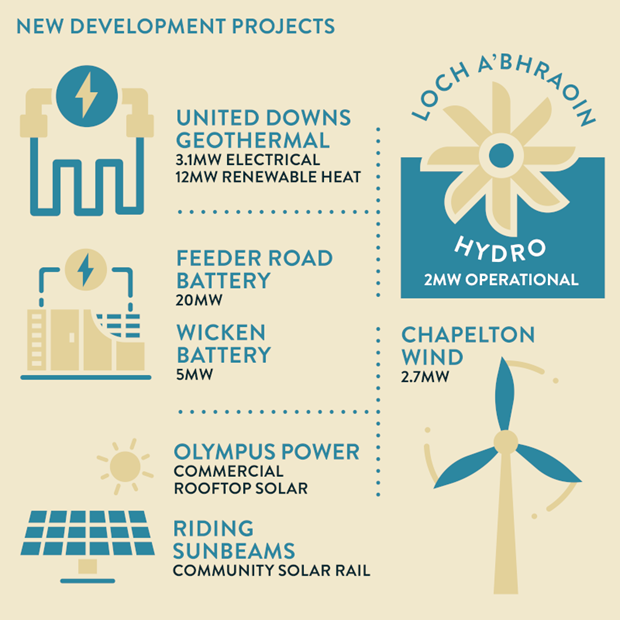
“Thrive is investing in the future of the UK energy system, reflecting our mission to support the transition to a sustainable energy future. The projects we have chosen to fund reflect the range of technologies and systems needed to decarbonise our electricity grid. This diversification complements our existing wind and hydro fleet, spreading risk and making the most of the opportunities currently available in the marketplace. With a significant improvement in the policy environment for renewables as the UK prepares to cut carbon emissions by 78% by 2035, we are well placed for growth in 2021 and beyond.” - Matthew Clayton, Managing Director, Thrive Renewables
The immediate focus continues to be securing the value of our existing assets and enabling growth. We are establishing sustainable routes to market for new onshore wind and solar and diversifying into battery storage and baseload renewable generation like geothermal and hydro. Thrive’s investment team grew in 2020, reflecting increased opportunities in the marketplace. We also reduced our average bank interest rate to 3.3%, taking advantage of lower interest rates, which will save £4M over the life of the debt.
Shareholders received a dividend of 7 pence per share in 2020. A 7 pence per share annual dividend is recommended to be paid in July 2021, reflecting positive performance of the operational portfolio.
"During what has been an extremely challenging year, the Thrive team has demonstrated its strength and an absolute determination to continue to deliver new renewable energy capacity across the country. Our sustainable energy portfolio contributed directly to the record levels of zero carbon electricity generated in the year in the UK. As we continue to invest and grow with our 5,400 shareholders' support, we are helping the country head positively towards a net zero future.” - Simon Roberts OBE, chair of the board, Thrive Renewables
In 2020 we repurposed our Community Benefit Programme and savings made on business travel to address the urgent needs of communities who host our renewable energy sites during the Covid-19 pandemic. We donated £39,050 to organisations tackling food poverty and isolation. We intend to reinitiate the Community Benefit Programme this year in its original format to help community buildings make essential energy efficiency and sustainability improvements. To date we have awarded 31 grants to 23 community spaces, saving 60 tonnes of carbon dioxide emissions annually.
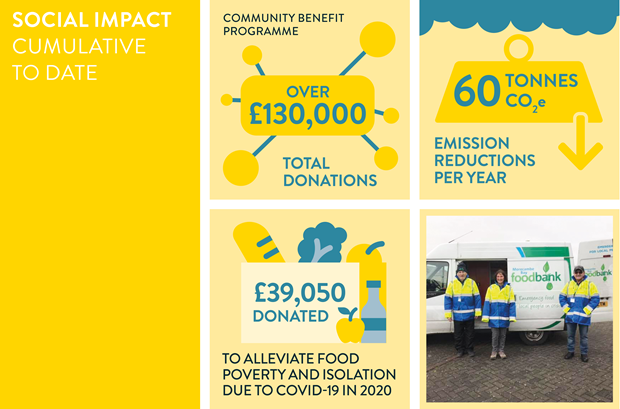
In early 2021 we achieved B Corp certification, reflecting 25 years as a purpose driven, ethical business. This makes us the highest ranked renewable energy company in the UK B Corp community, scoring particularly well on environmental and governance criteria.

References
1 - 2019 included £15.4m gain on sale of subsidiaries. 2020 includes higher tax charge due to the scrapping of the reduction in corporation tax from 19% to 17% in March 2020.
2 Impact Portfolio describing the Thrive’s share of projects owned plus the project Thrive is funding.
3 RenewableUK uses BEIS’s “all fossil fuels” emissions statistic of 446 tonnes of carbon dioxide per GWh of electricity supplied in the Digest of UK Energy Statistics (July 2020) p125 Table 5E (“Estimated carbon dioxide emissions from electricity supplied 2017 to 2019”), https://www.renewableuk.com/page/UKWEDExplained. Average per capita greenhouse gas emissions.
4 We are not able to source a nationally recognised means of calculating the water saving generated by generating electricity using wind and solar rather than thermal generation. The power sector consumes over 40% of Europe’s water, mainly for cooling purposes. We have identified that nuclear consumes approximately 2.7m3/MWh, gas plants 0.7m3/MWh and coal plants 1.9m3/MWh (https://windeurope.org/fileadmin/files/library/publications/reports/Saving_water_with_wind_energy.pdf). We have performed some crude, but we intend conservative analysis, using the UKs 2020 generation mix (Energy Trends March 2021 (publishing.service.gov.uk), to derive a conservative average water consumption per MWh figure. We believe that the 0.58m3/MWh is conservative as is attributes no water consumption to other thermal sources such as oil and bioenergy, or hydro. We have multiplied Thrive’s generation by this factor, assuming that if our renewable projects had not generated this electricity, the UK grid mix would have, arriving at 87,232m3 of water.
5 Water saved figure is lower than 2019 as UK grid used significantly less coal, nuclear and gas in 2020, and Thrive generation was 10% lower.
6 Calculated using the most recent statistics from the Department of Business, Energy and Industrial Strategy (BEIS) showing that annual UK average domestic household consumption is 3.578MWh, https://www.renewableuk.com/page/UKWEDExplained. Office of National Statistics, number of dwellings by housing tenure and district 2018 - https://www.ons.gov.uk/peoplepopulationandcommunity/housing/datasets/dwellingstockbytenureuk
7 The average electricity consumption of an electric vehicle is 307Wh/mile (https://ev-database.uk/cheatsheet/energy-consumption-electric-car), the average annual car mileage is 7400m (https://www.gov.uk/government/statistical-data-sets/nts09-vehicle-mileage-andoccupancy#car-mileage), the UK electric car fleet as of Sept 2020 is164,462 (https://www.gov.uk/government/statistical-data-sets/all-vehicles-veh01#licensed-vehicles), and the average annual mileage of 65,996 Electric Vehicles, (40% of the UK’s Electric Car Fleet)



